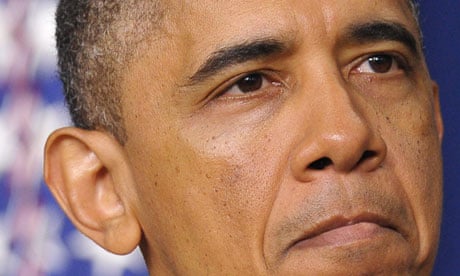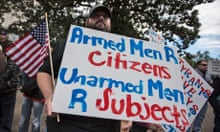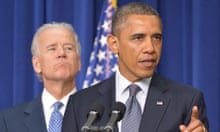When the firebrand Republican senator Ted Cruz went on conservative Laura Ingraham's radio show last week, the topic of conversation swiftly turned to Barack Obama.
As the president prepares to be inaugurated on Monday for a second term, Cruz, who is a Tea Party favourite freshly elected from Texas, let loose with both barrels. "He is feeling right now high on his own power!" Cruz fumed.
Cruz was particularly angry about Obama's plan to try to enforce tighter gun controls. But the president appears to be preparing a whole series of reforms that will raise the ire of the right. He has vowed action on immigration, hinted that he will try to tackle climate change, and has already taken a much tougher line with Republicans on fiscal issues, forcing them to agree to a tax rise for the wealthy.
For many it seems that Obama has been reinvigorated by his victory over Mitt Romney and might be in a position to win back a liberal base disappointed by a first term that many saw as timid, overly concerned with Republican co-operation and – most important – hamstrung by the needs of dealing with the Great Recession. "Maybe we now get to see what Obama would have been like if there had been no financial crisis," said Professor Shaun Bowler, a political scientist at the University of California at Riverside.
The political ground that Obama is standing on as he maps out strategy for the next four years certainly looks fertile. He ended up beating Romney easily, seeing off a challenger whom many thought was the Republican party's strongest candidate, albeit in a weak field. But Obama is likely to strike quickly as the honeymoon period for second terms usually lasts little longer than a year before electoral considerations of the 2014 mid-term elections loom into view.
Indeed, he has already done so. After being widely criticised in his first four years for a lack of savvy during negotiations with the Republican-controlled House of Representatives, Obama has suddenly taken a much harder line. In debates over the so-called "fiscal cliff" of tax hikes and spending cuts at the end of last year, Obama's team secured a deal widely seen as a victory. That tougher stance has also been matched by Obama staking out a strong position on forthcoming talks with the Republicans in Congress over raising the debt ceiling. Indeed, only days after Obama gave a speech on the issue marked by stern language the Republicans last week appeared to cave in and moved to extend the ceiling for another three months.
It marks an apparent shift in Obama's view of the presidency, from one where he has to act as a conciliator to one where he can lead from the front. "He has made noises that he is going to give up his old theory of the presidency and he is going to now use it as a 'bully pulpit'," said Professor James Josefson, a political scientist at Bridgewater College in Virginia.
The change has also won Obama praise from party supporters and advisers. "He will decide what he wants to do and he will just do it. He's going to push ahead," said Ted Kaufman, a former Democratic senator from Delaware who was Vice-President Joe Biden's chief of staff for 19 years.
But as Obama finds himself at the head of a relatively unified Democratic party he is staring at a Republican party in disarray and riven by civil war. Its conservative wing, still infused by the Tea Party, believes Romney lost because the party was not rightwing enough. But a powerful cohort of more moderate leaders, such as Louisiana governor Bobby Jindal and New Jersey governor Chris Christie, want to broaden its appeal. They see the party as having lost five out of the last six popular votes at a presidential level and staring at a future where Democrat-friendly minorities, especially Hispanic voters, are getting ever more powerful at the ballot box.
That has seen the party indulge in rare outbursts of public bickering. Christie slammed House speaker John Boehner over delays to aid in the wake of Hurricane Sandy that devastated his home state. Jindal has even warned that Republicans need to "stop being the stupid party". The fight has reversed the usual dynamic of American politics – where Democrats are seen as fractious and Republicans disciplined – and raised hopes that Obama might actually extend his power in the 2014 mid-terms, which would usually be a tricky election to face. At the moment Obama's approval ratings are at a healthy 55%, compared with an anaemic 24% for House Republicans.
But it is not all good news for Obama and the Democrats. America's political system is defined by checks and balances between competing institutions, and Republican control of the House still acts as a major check on his ambitions. Though many experts believe the Republicans may have to give ground on an issue like immigration reform, other policy areas – such as gun controls and limiting the social impact of spending cuts – might still end up scuppered. "It still depends on how co-operative the Republicans are going to be, and for most of them Obama is just thought of as appalling, no matter what he does or says," said Bowler.
Republicans may be able to block a great deal of Obama's second-term agenda but on a host of things – from gun controls to gay rights to abortion and women's issues – they are frequently seen as far to the right of mainstream public opinion. "Obama is either going to win on these issues legislatively or he is going to win on them in the arena of public opinion. He is going to have a year of success ahead of him either way, even if it ends up being just as much appearances as substance," Bowler said.
That is a remarkable turnaround for Obama. It is only four short months since the president gave a disastrous performance during his first debate with Romney, causing the Republican to spike in the polls and suddenly look like he might win. Right up until election night itself last November many Republicans, including Romney himself, who wrote no concession speech, and a few nervous Democrats believed they could be witnessing the return of a Republican to the White House. Now, as Obama plots out a second term aimed at cementing his legacy, those doubts and fears feel a long time ago. "He has been freed by the fact that the American people seem to be on his side," Kaufman said.
What the voices say on the left and right
Heather Hurlburt
Executive director, National Security Network, focusing on foreign policy; speechwriter for President Clinton
Obama's first term foreign policy was spent working to clear away the debris of what had come before: Iraq, Afghanistan, torture, but also the threat of global economic meltdown and an Arab world hangover more than 30 years in the making.
In his second term, he now has the opportunity to reshape the model and direction of America's outreach to the world for the next 10 years or more. Here are longer-term priority areas:
Clarity and oversight on counterterrorism: setting clear limits and public oversight on where the US goes to war, and how, particularly around targeted killings and the use of remote or cyber-warfare tools, he can constrain his successors, set global norms and increase the effectiveness of a counter-terrorism agenda.
Economic statecraft: Hillary Clinton's signature initiative, reasserting the importance and breadth of economic diplomacy, must outlast her tenure. Efforts overseas will have to be matched by budget realignments at home, to make economic and trade diplomacy as empowered as the military-first approaches of the previous decade.
Pursue the promise of Prague: Obama cannot count on much help from Moscow or Tehran or even the US Congress in reducing the role of nuclear weapons in US security policy. But there are steps he can take alone: accelerating US reductions under the New Start [arms limitation] treaty, reconsidering and reducing the number of warheads demanded by US nuclear targeting policy, making further cuts without waiting for Moscow.
Steve Mitchell
Head of pollsters Mitchell Research and Communications
Any ideas that I, or any other Republican might have, would never be listened to by Obama. I don't have the time or inclination to think about what he should take a chance on doing. Obama's rhetoric and actions today are diametrically opposed to the ideals on which he ran in 2008.
Whether on the fiscal cliff, budget deficit, guns, or any other issue, he seems gleeful in his desire to bludgeon his Republican opponents and win every contest by 100-0.
The fact that he has four more years to do some of the things I think he may do is quite disconcerting to me. My hope is that he follows the Hippocratic Oath and "does no [more] harm."
Jim Dean
Chair, Democracy for America
President Obama should stay in touch with his inner Teddy Roosevelt and continue to lead with the same strong conviction he is displaying regarding gun safety. Americans favour strong leadership, even if they do not always agree with the substance of a leader's position. If the recent elections proved anything, they proved that the country is continuing to move beyond the discourse in Washington that is too often fuelled more by money and less by public support.In the case of gun safety, most of the public, and even NRA members, support the President. It is time for him to lead the public rather than hope for acquiescence. The people have overwhelming elected Obama, not once but twice – now he must use that position to get things done, and not shy away from a fight.
Larry Haas
Political commentator and former aide in Clinton White House
In the Middle East, Asia, Africa, and elsewhere, dissidents are struggling to bring freedom and democracy to their nations, but the autocrats in power are finding harsher, more creative ways to crack down on them. Traditionally, the US has led global efforts to advance freedom and democracy around the world and US support has proven important to the important gains of recent decades.
To date, however, Obama has provided only lukewarm support for the cause. With his last election behind him, Obama should shift course and more forcefully put the US behind the brave democratic activists, labour leaders, journalists and others who are putting their lives on the line every day.
Bolder U.S. support for the cause will make it more likely that the dissidents and their movements will succeed. That, in turn, will make the world a safer and more prosperous place from which the United States and every other nation can benefit."
Meghan Clyne
Special assistant and speechwriter to President George W Bush and first lady Laura Bush
Obama should start by eliminating the danger to religious liberty posed by Obamacare. Under the law, most employers are required to pay for female employees' sterilisations and contraceptives, including some drugs that can destroy fertilised embryos. This presents many religious employers, both institutions and individuals, with an impossible choice: violate their religious beliefs, or close down.
Obama needed women's votes last year, and forcing religious employers to provide birth control was good politics. But the election is over, and the consequences of the "HHS mandate," as the requirement is known, are starting to be felt.
Obama can fix the problem himself by ordering health and human services secretary Kathleen Sebelius to rewrite the rule and exempt any employer who objects to the mandate for religious reasons.
Melissa McEwan
Writer and founder of the progressive blog Shakesville
I would love to see President Obama take a more active role in defining the national conversation on reproductive rights, with an uncompromising position in favour of choice. During his first term, a record number of pieces of anti-choice legislation were proposed and passed in state legislatures and our pro-choice president must use his bully pulpit to give visibility to the war on agency being waged across the nation.
I was deeply moved by the president's affirmation of his support for marriage equality, which was followed by an increase in national support for same-sex marriage. I hope, in his second term, we may see a similarly influential advocacy on behalf of choice. He cannot intervene in state legislatures to stop assaults on reproductive rights, but he can be a vocal ally.




Comments (…)
Sign in or create your Guardian account to join the discussion